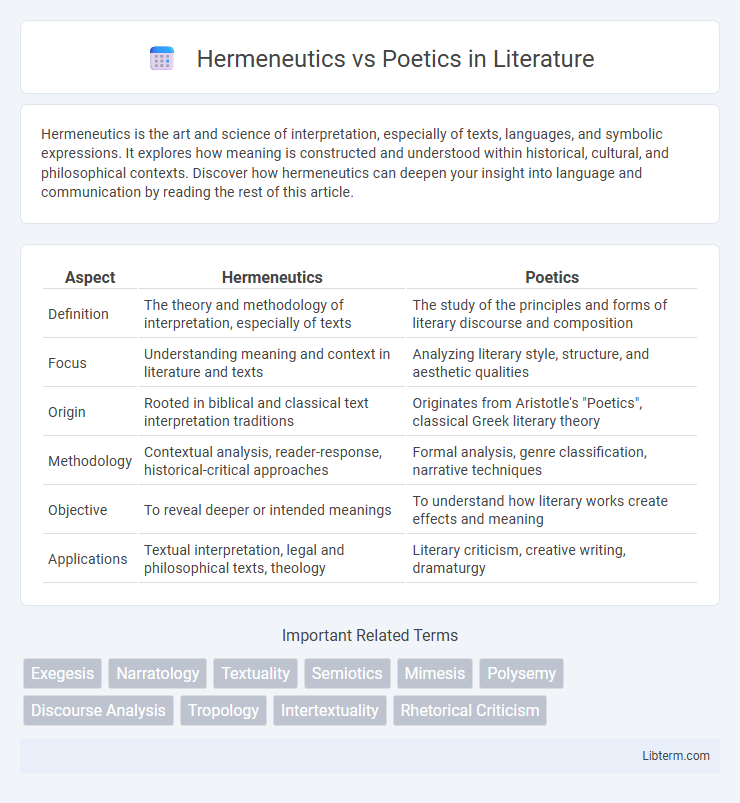Hermeneutics is the art and science of interpretation, especially of texts, languages, and symbolic expressions. It explores how meaning is constructed and understood within historical, cultural, and philosophical contexts. Discover how hermeneutics can deepen your insight into language and communication by reading the rest of this article.
Table of Comparison
| Aspect | Hermeneutics | Poetics |
|---|---|---|
| Definition | The theory and methodology of interpretation, especially of texts | The study of the principles and forms of literary discourse and composition |
| Focus | Understanding meaning and context in literature and texts | Analyzing literary style, structure, and aesthetic qualities |
| Origin | Rooted in biblical and classical text interpretation traditions | Originates from Aristotle's "Poetics", classical Greek literary theory |
| Methodology | Contextual analysis, reader-response, historical-critical approaches | Formal analysis, genre classification, narrative techniques |
| Objective | To reveal deeper or intended meanings | To understand how literary works create effects and meaning |
| Applications | Textual interpretation, legal and philosophical texts, theology | Literary criticism, creative writing, dramaturgy |
Introduction to Hermeneutics and Poetics
Hermeneutics explores the theory and methodology of interpretation, focusing on understanding texts, symbols, and meanings within their historical and cultural contexts. Poetics examines the principles and structures of literary composition, emphasizing the creation, form, and aesthetic qualities of poetry and artistic works. Together, Hermeneutics and Poetics provide complementary approaches for analyzing and appreciating literature, bridging interpretation with creative expression.
Historical Origins and Key Figures
Hermeneutics, rooted in ancient Greek philosophy and further developed during the Renaissance by thinkers like Friedrich Schleiermacher and Hans-Georg Gadamer, focuses on the theory and methodology of interpretation, especially of biblical and literary texts. Poetics, originating with Aristotle's foundational work "Poetics," examines the principles of literary composition and the nature of poetic genres, influencing classical and later literary criticism. While hermeneutics emphasizes understanding and meaning-making in texts, poetics concentrates on the art and structure of literary creation.
Defining Hermeneutics: Methods and Purpose
Hermeneutics is the systematic study of interpretation, primarily applied to texts, aiming to uncover deeper meanings and contextual understanding through methods such as historical analysis, linguistic examination, and philosophical inquiry. It involves decoding the intention behind a text, considering cultural and temporal contexts to bridge the gap between the author's perspective and the reader's comprehension. This discipline contrasts with poetics, which centers on the structure, style, and aesthetic qualities of literary works rather than their interpretation.
Understanding Poetics: Core Concepts and Approaches
Poetics centers on the study of literary forms, structures, and aesthetic principles that shape creative expression, emphasizing narrative techniques, imagery, and genre conventions. Core concepts include mimesis (imitation of reality), catharsis (emotional purification), and the exploration of plot, character, and diction as foundational elements. Approaches to poetics involve formalist analysis, structuralism, and reader-response theories to decode meaning and artistic intent in texts.
Comparative Analysis: Interpretation vs. Creation
Hermeneutics centers on the interpretation and understanding of texts, emphasizing meaning extraction through contextual and historical analysis. Poetics focuses on the creation and aesthetic construction of texts, exploring artistic techniques and imaginative expression. A comparative analysis reveals hermeneutics prioritizes decoding authorial intent and reader reception, whereas poetics emphasizes crafting narrative structures and symbolic elements.
Philosophical Foundations and Influences
Hermeneutics, rooted in the philosophies of Schleiermacher and Gadamer, emphasizes the interpretation of texts through historical context and the dialogical process between reader and author, prioritizing understanding meaning and intention. Poetics, tracing back to Aristotle's foundational theories, concentrates on the principles of literary creation, genre conventions, and aesthetic expression, shaping how narratives evoke emotions and convey universal truths. Both fields influence contemporary literary theory, with hermeneutics shaping interpretive frameworks and poetics informing creative techniques and structural analysis.
Hermeneutics in Literary Criticism
Hermeneutics in literary criticism centers on the interpretation and understanding of texts by uncovering deeper meanings through contextual analysis, authorial intent, and historical background. This approach emphasizes the dialogic relationship between the reader and the text, allowing multiple layers of significance to emerge from the interaction. Hermeneutics contrasts with poetics, which primarily focuses on the structural and aesthetic elements of literary works rather than their interpretative depth.
Poetics in Creative Practice
Poetics in creative practice emphasizes the structured use of language, imagery, and rhythm to evoke emotions and convey meaning, guiding artists in the construction of narrative and aesthetic experience. Unlike hermeneutics, which focuses on interpretation and understanding of texts, poetics centers on the creation process, exploring how literary devices and stylistic elements shape audience engagement and artistic expression. This approach informs disciplines such as poetry, theater, and visual arts by providing frameworks for analyzing and generating creative content that resonates on experiential and emotional levels.
Intersections and Divergences
Hermeneutics and poetics both examine texts but differ in focus, with hermeneutics emphasizing interpretation and meaning extraction, while poetics centers on the structure and creative elements of literary works. Their intersection lies in analyzing how meaning is constructed through narrative techniques and linguistic choices, bridging the interpretive process with artistic expression. Divergences emerge in their methodologies: hermeneutics applies philosophical and critical frameworks to uncover deeper understanding, whereas poetics investigates formal properties and aesthetic functions within the text.
Contemporary Relevance and Future Directions
Hermeneutics remains crucial in contemporary discourse for interpreting digital texts and cultural artifacts, emphasizing context and meaning in a fragmented media landscape. Poetics drives innovation in narrative techniques across emerging platforms like virtual reality and interactive storytelling, shaping future literary and artistic expressions. Integrating hermeneutic methods with poetics paves the way for interdisciplinary approaches that enhance understanding and creation in an increasingly complex communicative environment.
Hermeneutics Infographic

 libterm.com
libterm.com